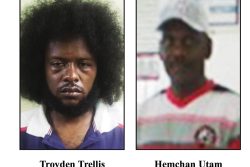BELGRADE/MITROVICA (Reuters) – NATO peacekeepers in Kosovo (KFOR) reinforced troops at a border crossing in the ethnic Serb north yesterday, a day after more than a dozen people were injured in clashes.
About 50 German KFOR troops in armoured vehicles and bulldozers were also deployed close to the main bridge in the divided town of Mitrovica.
A Reuters correspondent said KFOR troops deployed armoured vehicles, sand bags and barbed wire at the Jarinje crossing on the border with Serbia, about 100 km (60 miles) from Kosovo’s capital Pristina.
Sixteen Kosovo Serbs and four peacekeepers were injured there on Tuesday during a confrontation between KFOR troops and a Serb crowd rallying against the removal of a barrier.
Kosovo’s government in Pristina is trying to reinstate its presence in the largely lawless north, home to 60,000 Kosovo Serbs who still pledge allegiance to Belgrade.
Kosovo, with its majority ethnic-Albanian population, is a former province of Serbia which became independent in 2008 after a 1998-99 war and years under United Nations rule.
It is recognised as an independent state by more than 80 countries, including the United States and most of the European Union, but not by Serbia or its ally Russia.
On Sept. 16, Pristina sent police and customs officials to two northern border crossings, Brnjak and Jarinje, previously staffed mostly by ethnic Serbs. In response, Kosovo Serbs blocked roads leading to the border and laid a dirt track near Jarinje to bypass the crossing.
NATO accused Serb extremists of provoking the violence on Tuesday when witnesses said KFOR soldiers used fire arms, teargas and rubber bullets. NATO said KFOR positions came under fire and that pipe bombs were thrown at peacekeepers. Serb officials said six protesters received serious gunshot wounds while others suffered minor injuries.
In a statement, NATO said people had the right to protest but “when protests turn violent and freedom of movement is impeded, NATO will need to act.”
Tuesday’s clashes prompted Belgrade to cancel EU-mediated talks with Pristina in Brussels aimed at improving cooperation in areas such as the flow of goods and property rights. The talks will resume “when the Serbian side is ready to re-engage,” said Robert Cooper, who mediates on behalf of the EU. Serbian President Boris Tadic had telephone talks with NATO Secretary General Anders Fogh Rasmussen and demanded an investigation of the Jarinje incident, a statement from Tadic’s office said.
In New York, Russian Foreign Minister Sergei Lavrov asked for urgent consultations at the UN Security Council over the Kosovo violence after meeting his Serb counterpart Vuk Jeremic.
Earlier yesterday in Mitrovica, masked Serbs attacked a group of ethnic Albanian and Roma workers at the Ibar river that divides the town and separates southern ethnic-Albanian and northern Serb parts of Kosovo, police said
Albanians from an ethnically-mixed neighbourhood damaged a car owned by a Serb, and, overnight, Serbs stoned two police cars, a bank and tried to burn two internationally-owned shops.








